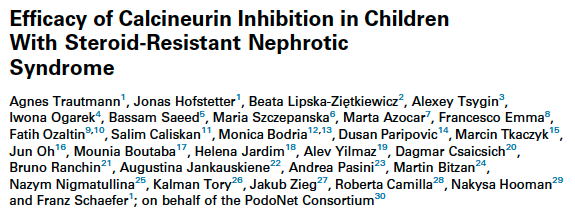Efficacy of Calcineurin Inhibition in Children With Steroid-Resistant Nephrotic Syndrome
Trautmann, Agnes et al. 2025, Kidney International Reports, Article in Press
Steroid-resistant nephrotic syndrome (SRNS) is a rare and diverse disorder, accounting for 10–15% of childhood nephrotic syndrome cases. Approximately 20–30% of SRNS cases are linked to genetic variants affecting podocytes, while the majority remain of unknown cause. Current IPNA guidelines recommend calcineurin inhibitors (CNIs) as first-line immunosuppressive therapy, showing response rates between 20% and 77%. Long-term outcomes are closely linked to treatment responsiveness and are less favorable in hereditary forms.
The PodoNet registry, the largest pediatric SRNS database, provides new insights into the effectiveness of CNI therapy across both genetic and non-genetic cases. Analysis focuses on the anti-proteinuric effects of CNIs, their duration during and after treatment, dose-response relationships, and the additional benefits of RAAS inhibitors. These findings contribute to a better understanding of individualized treatment strategies for children with SRNS.


